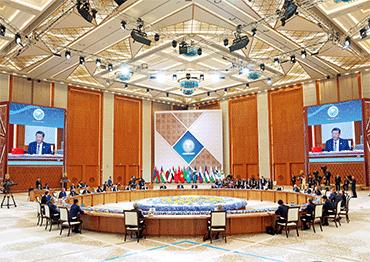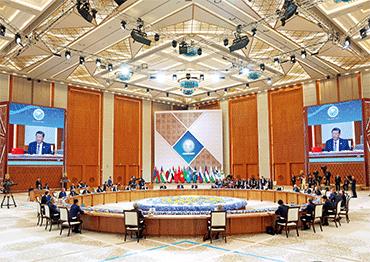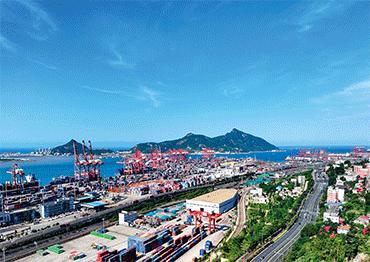There is little surprise that the SCO summit was closely watched by Western analysts from the SCO vs NATO perspective. According to Zhou Bo, a senior fellow of the Center for International Security and Strategy at the Beijing-based Tsinghua University, there are major differences between NATO and the SCO. While NATO is the world’s largest military alliance bound by common values and common enemies, the SCO is “open, inclusive and non-ideological,” commented Zhou in an article published in April 2023 in the South China Morning Post.
Zhou argued that while NATO needs to look for “new threats, more recently in the Indo-Pacific, to justify its survival,” the SCO, which started as a group to manage border disputes among member states, is more concerned about preventing internal conflicts.
Moreover, compared to NATO, economic cooperation plays a major role in binding member states together in the SCO, Zhou said. It is notable that it was during his keynote visit to Kazakhstan in September 2013 when President Xi proposed the idea of building an “economic belt along the Silk Road.” Combined with the proposal of the 21st Century Maritime Silk Road, the idea eventually became the Belt and Road Initiative (BRI). Since then, central Asia has played a central role in both the SCO and the BRI.
During the summit, SCO leaders agreed on more than 20 documents, covering economy, finance, security and people-to-people exchanges, and jointly released the Astana Declaration, which calls for “a more just and multipolar world order.” They also reaffirmed their goal of increasing the use of national currencies in mutual trade and settlements and pledged to continue working on the creation of the SCO Development Bank, the SCO Development Fund and the SCO Investment Fund.
On July 3, Xi and Tokayev attended the opening ceremony of the Trans-Caspian international transportation route via video link. The Caspian Sea is the world’s largest inland body of water, surrounded by Kazakhstan, Russia, Turkmenistan, Iran and Azerbaijan, all SCO member states or dialogue partners except for Turkmenistan. The route’s opening marks the first time Chinese freight trucks can reach ports along the Caspian Sea coast through direct road transport.
Earlier in June, China, Kyrgyzstan and Uzbekistan also signed an agreement on construction of the China-Kyrgyzstan-Uzbekistan railway. The 523-kilometer railway project is estimated to cost US$8 billion. Forming part of the BRI, the project will improve Central Asia’s connectivity and help the region integrate into global industrial and supply chains.
In his speech at the SCO Plus Meeting on July 4, Chinese President Xi Jinping proposed that 2025 be designated the SCO Year of Sustainable Development. As the first major event under China’s presidency, the Green Development Forum of SCO Countries opened in the coastal city of Qingdao, East China’s Shandong Province, on July 8. In his congratulatory letter to the forum, Xi noted that it is the consensus of SCO countries to protect the environment and promote green development. Qingdao was designated as the tourism and cultural capital of the SCO for 2024 to 2025 to “help unlock the tourism potential of the region and further strengthen cultural cooperation,” says the Astana Declaration.
At the SCO Plus Meeting, Xi proposed to establish an SCO digital education alliance, and offered to provide at least 1,000 training opportunities on digital technology to fellow countries in the SCO in the next three years.
For Li Yongquan, director of the Institute for the Social Development of Europe and Asia of the Research Centre of the State Council, the SCO has established a model for new types of international relations and regional cooperation. Li told NewsChina that this year’s SCO summit has shown that after more than 20 years of development, the SCO, with its underlining principle of the “Shanghai Spirit,” which features mutual trust, mutual benefit, equality, consultation, respect for diverse civilizations and pursuit of common development, has shown growing appeal to countries of the Global South, which have diverse political systems, levels of economic development, and cultural background.
A thousand young people from countries in the SCO will be invited to China for exchange opportunities in the next five years.
Cultural inclusiveness and resilience, which is based on the respect for cultural diversity highlighted in the SCO Charter, is one of the reasons for the SCO’s growing role in the international community, commented Xing Guangcheng, director of the Institute of Chinese Borderland Studies of the Chinese Academy of Social Sciences, in an article he wrote for China News Service on July 7.

 Old Version
Old Version


